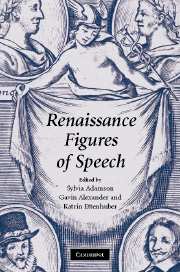Book contents
- Frontmatter
- Dedication
- Contents
- List of illustrations
- List of contributors
- Preface
- Note on spelling and references
- Introduction: the figures in Renaissance theory and practice
- Chapter 1
- Chapter 2
- Chapter 3
- Chapter 4
- Chapter 5
- Chapter 6
- Chapter 7
- Chapter 8
- Chapter 9
- CHAPTER 9 Syncrisis: the figure of contestation
- Chapter 10
- Chapter 11
- Chapter 12
- Chapter 13
- Notes
- Suggestions for further reading
- Index
CHAPTER 9 - Syncrisis: the figure of contestation
Published online by Cambridge University Press: 05 February 2014
- Frontmatter
- Dedication
- Contents
- List of illustrations
- List of contributors
- Preface
- Note on spelling and references
- Introduction: the figures in Renaissance theory and practice
- Chapter 1
- Chapter 2
- Chapter 3
- Chapter 4
- Chapter 5
- Chapter 6
- Chapter 7
- Chapter 8
- Chapter 9
- CHAPTER 9 Syncrisis: the figure of contestation
- Chapter 10
- Chapter 11
- Chapter 12
- Chapter 13
- Notes
- Suggestions for further reading
- Index
Summary
In a famous scene in Le Bourgeois Gentilhomme, Molière's Monsieur Jourdain learns to his delight that there is a technical term to describe the style in which he has spoken unwittingly throughout his life: that he has always spoken in prose. ‘Really?’, he says in excitement to his tutor; ‘You mean I've been speaking prose for over forty years without knowing it?’ And he goes off at once to announce this important fact to his wife. ‘Do you know what I'm speaking right now? Prose.’ Many Renaissance terms of rhetoric might be thought to offer a similar satisfaction, furnishing us with formal terms — amphibologia, tautologia, insultatio, barbarismus — to describe styles of speech we had already effortlessly mastered without their aid. Syncrisis may look at first sight like a term of this kind. Unfamiliar nowadays not just to the general public but to many scholars as well, absent from almost every modern dictionary, syncrisis is the name of an exercise that once served throughout Europe as a central element in the school curriculum, in the training of orators, and in the formation of principles of literary and moral discrimination. Yet despite its curious erasure from modern consciousness, syncrisis is still widely practised today by writers who would no doubt be as startled as M. Jourdain to discover there is a formal term to describe what they do, when they assess side-by-side the achievements of (let us say) Mozart and Haydn, or of Matisse and Picasso, or of Auden and Eliot, or of Churchill and Thatcher, or of George Michael and Boy George, or of Chelsea and Manchester United, or of Dell and Apple, or Pepsi and Coke.
- Type
- Chapter
- Information
- Renaissance Figures of Speech , pp. 167 - 178Publisher: Cambridge University PressPrint publication year: 2007



